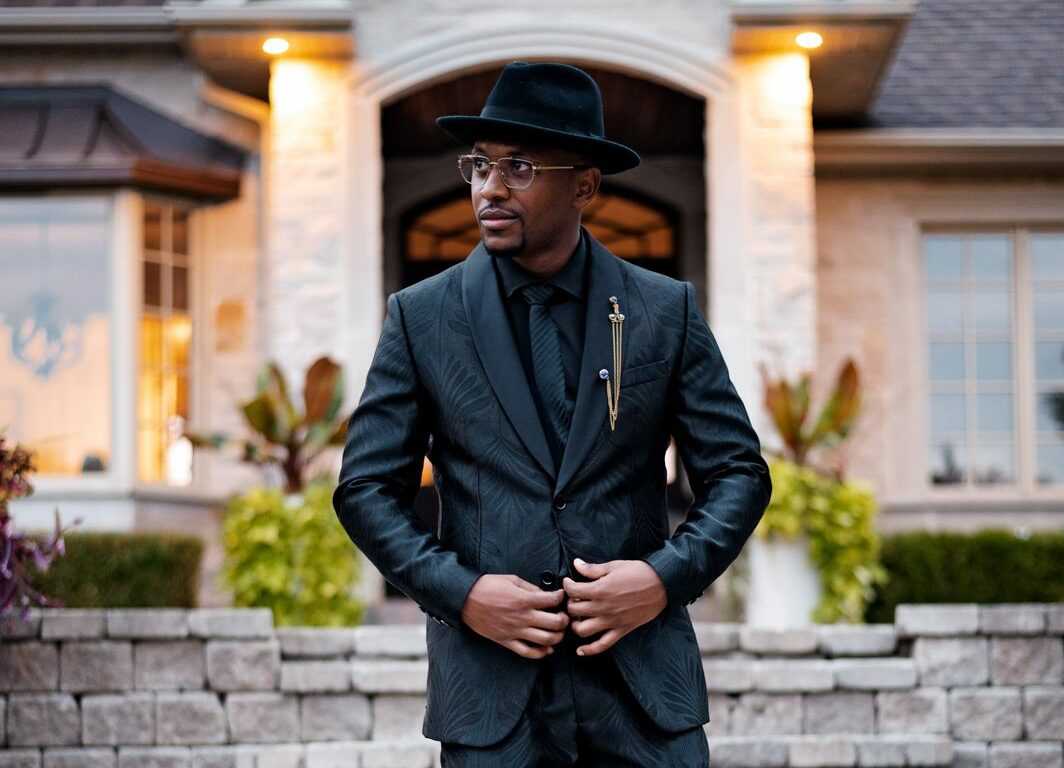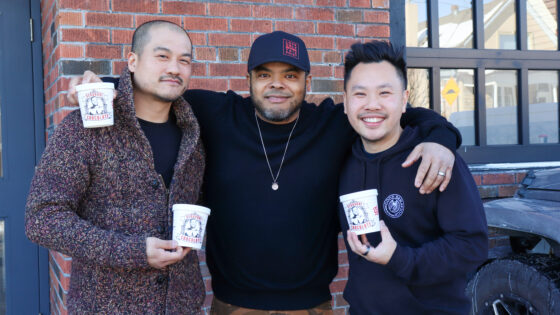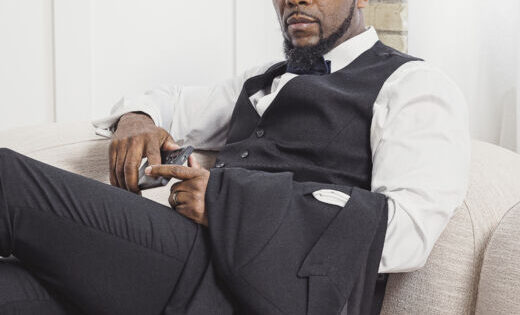on
BY SIMONE J. SMITH
“The camera gave the power to travel the world. I was able to connect with my art.”
When he walked into the office, his charisma was infectious, and I liked his energy right away. When we finally had a chance to talk, he had just finished shooting five documentaries in ten days. I happened to be one of the documentaries that he had shot. Our very own Selina McCallum, who happened to be the director of my documentary, introduced me to Dwayne Holness.
Even though he was tired, Dwayne took some time to share with me how his last ten days had been.
“I like being able to share the information that I have received over the years with younger filmmakers I was teaching a few years ago, but I haven’t really been in a position to be hands on, so this was great. People ask for advice, and to spend two days with them, and to be a part of their journey, with it being their first documentary, it was interesting.
It is about leaving a good memory with people. I am always trying to impact, set an example, and be an example.”
Dwayne Winston Holness was born in Spanish Town Jamaica. He came to Canada with his mom at five years old. She wanted a better life for them, so she did what she could to provide this for herself and her son.
She started working as a nurse, and her work schedule took her away from Dwayne for long periods of time. She would work 7am – 3pm, or 3pm – 11pm. This meant that Dwayne spent a lot of time alone. “I had to navigate a new country, a new space,” and as you can imagine, this was not easy for him.
They lived with his grandmother for a couple years at Jane & Wilson, and then he moved to Jane & Finch. Dwayne tells me that here is when life really started. He attended Firgrove Public School, Oakdale Public School, and Beverley Heights Middle School, and during this time Dwayne was introduced to multiculturalism that many experience if you live in Canada.
Dwayne admits that he was bullied when he was younger. Sometimes he didn’t want to leave the house. He would pray for the bullying to stop, and it was during this time that he was introduced to the idea of fair-weathered friends. It was lonely sometimes for Dwayne, and when he attended middle school, he began to act out. His mom moved him from Oakdale Public School to Beverley Heights, and this is when his first shift began.
The crowd of people he hung around changed, and he met a friend whose mom introduced him to the world of acting. This was the beginning of his artistic journey.
“A friend of mine, his mom was taking him to meet an acting agent. I went with them and signed up with him. My first acting opportunity was on Soul Food. I got paid $46.00 for eight hours. I was like, What was this?
I did this a couple more times, and then I was invited to Hamilton to be on the set of Street Time. The director one day pointed at me and said, ‘Come. I want you to say a line in this scene. In the scene I was supposed to talk to my friends, and then someone was supposed to get shot. It was cool because I was actually the centre of attention. Everyone was watching, and that gave me a sort of high.”
That was it. The acting bug had bitten Dwayne, so naturally he began to take it more seriously. ACTRA Union was the next part of his journey. There was something about acting that made him feel special. At sixteen years old, he signed his first autograph. “I wanted to explore acting a little more, so I got into theatre.”
The industry opened up for Dwayne, and slowly his resume began to fill up. “I was in Degrassi when Drake was still on there. I used to be on set so much and would actually skip school sometimes. I was getting paid $21.00 per hour. I became the fly kid, I had all this stuff. I felt like my life was special. I was getting some crazy opportunities.”
Being on set taught him about life, especially proper etiquette and how to conduct himself professionally. It was such a contrast from his everyday life. Dwayne admits that it was like having one foot in the hood, and then another foot in the acting world.
“I learned about time and time management. Call time was at 6:30 am in the morning, and this meant that I had to be in bed on time so that I was able to get up and take the bus across town. It kept me away from the street life, but of course, I got caught up at times. I got expelled from school, and that brought on another shift in my life. The friends I thought had my back, didn’t. I noticed that I didn’t hear from people anymore.
My mom told me I was stressing her, and that hurt me. I knew I was hurting her and seeing the pain in her eyes woke me up. It became clear at that time that besides my family, I knew no one was going to be there, so I had to be there for myself. I felt alone again. I knew I had to make something of myself so that people knew I was worth it.”
Dwayne ended up attending Emery Collegiate Institute, and somehow he became the popular kid. People wanted to know who he was. They had heard about his acting career, and this is when he finally met someone he could count on; his best friend Femi Lawson.
“I learned a lot from him. He was completely different from me. He showed me a different way to look at life, and it wasn’t the street way.”
Dwayne’s house became a creative hub because with his mom being a nurse, she wasn’t home a lot. “I was the computer guy. I had all the latest gadgets and software. I could edit videos, engineer music. At that time no one was making videos and putting them online.” It was during this time that the man we know as Dukey Dukez, began to establish his roots.
He met another young man that would change his life forever. He was a young kid with swag and style who went by the name of Redway.
“I went to Mississauga to meet him, and we clicked right away. I introduced him to Femi, and this is when the magic began. We all had unique skills, and together we were able to develop them. We created a group that went by the name High Class. It was about our mentality. We always wanted to represent quality. The group became solidified when Dwayne Facey joined us. He had an entrepreneurial mind. It could not be denied that our group had the recipe for success. We had this ability to spot talent coming out of the city.”
People began to hear about Dwayne’s work, and would come to him to shoot music videos. They decided to make their mini corporation official, and that was the genesis of Corex Creative. The team experienced a tragic loss when their beloved Redway died in a horrific car accident, on August 1st , 2015. The loss hit Dwayne hard, and his perspective on how to live his life changed drastically.
With a new outlook on life, and an intensified work ethic, Dwayne’s star has risen, and his popularity has drawn the likes of Jr. Reid, Chronixx, and the late Hodan Nalayeh. He was presented with an award from the YMCA for employing youth in the community, and is known for his motivational morning #calculatedsteps. This was an initiative to motivate success driven individuals. For 150 days straight, he would shoot videos at 6:30 am in the morning from wherever he was in the world.
What would Dwayne say is the most important lesson he has learned on his journey?
“The most important aspect of success is having a team. I know how powerful a team can be.”
Stay in the loop with exclusive news, stories, and insights—delivered straight to your inbox. No fluff, just real content that matters. Sign up today!
We, as humans are guaranteed certain things in life: stressors, taxes, bills and death are the first thoughts that pop to mind. It is not uncommon that many people find a hard time dealing with these daily life stressors, and at times will find themselves losing control over their lives. Simone Jennifer Smith’s great passion is using the gifts that have been given to her, to help educate her clients on how to live meaningful lives. The Hear to Help Team consists of powerfully motivated individuals, who like Simone, see that there is a need in this world; a need for real connection. As the founder and Director of Hear 2 Help, Simone leads a team that goes out into the community day to day, servicing families with their educational, legal and mental health needs.Her dedication shows in her Toronto Caribbean newspaper articles, and in her role as a host on the TCN TV Network.













